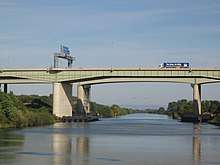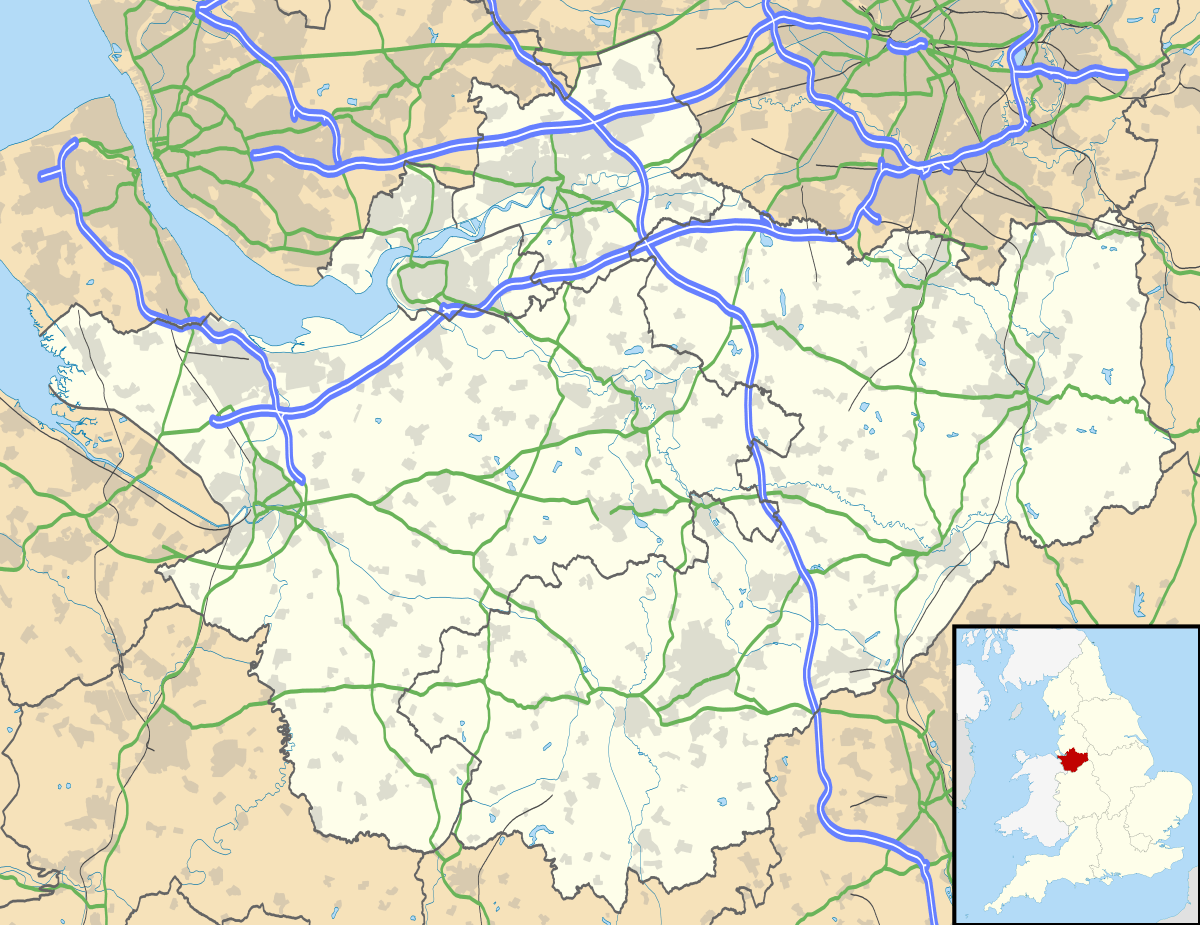Thelwall Viaduct
| Thelwall Viaduct | |
|---|---|
 Main span of the two viaducts over the Manchester Ship Canal, with the oldest bridge in the foreground | |
| Coordinates | 53°23′26″N 2°30′21″W / 53.3906°N 2.5059°WCoordinates: 53°23′26″N 2°30′21″W / 53.3906°N 2.5059°W |
| Carries |
[[Image:Motorway Left.svg|[ |x30px|link=]] |
| Crosses |
Manchester Ship Canal River Mersey |
| Locale | Lymm/Woolston, Cheshire |
| Maintained by | Highways England |
| Characteristics | |
| Design | Plate girder bridge |
| Material | Reinforced concrete, Steel |
| Total length |
4,414 ft (1345.4 m) northbound 4,500 ft (1371.6 m) southbound |
| Longest span | 336 ft (102.4 m) |
| No. of lanes |
4 each direction Slip road on the northbound descent |
| History | |
| Opened |
First bridge: 29 July 1963 Second bridge: 1995 |
| Statistics | |
| Daily traffic | 159,651 (2017) |

The Thelwall Viaduct (grid reference SJ664883) is a steel composite girder viaduct in Lymm, Warrington, England. It carries the M6 motorway across the Manchester Ship Canal and the River Mersey. Its location on the motorway network is between junctions 20 and 21 of the M6, the former being also known as junction 9 of the M56.
It actually comprises two entirely separate bridges, one of 4,414 feet long carrying the northbound carriageway, which was the longest motorway bridge in England when it was opened in July 1963, and one 4,500 feet long carrying the southbound carriageway which was opened in 1995.[1] The longest single span is the one of 336 feet crossing the ship canal.[1]
In July 2002 a failed roller bearing was discovered and it became necessary to close all but one northbound lane. As the M6 at the time carried an estimated 150,000–160,000 vehicles per day, this led to serious congestion.[2] The viaduct was not completely reopened to daytime traffic until February 2005, and subsequently remained partially closed at night for further remedial work to take place.[3] In all, 148 bearings were replaced, with the repair scheme costing around £52 million.[4]
Given the bridge's height and openness to the elements it has frequently been the subject of speed reductions due to strong gusts of wind that badly affect the stability of high-sided vehicles. On several occasions lane closures have resulted as a consequence of articulated vehicles simply being blown over. However, the open sides of the bridge are a deliberate design feature to reduce the likelihood of snow drifts building on the carriageways.
In April 2011 a massive free party took place under the bridge, with reportedly over 5,000 ravers in attendance.[5]
1971 accident
At approximately 8am on 13 September 1971 thick fog led to a catastrophic multiple vehicle crash on the viaduct. More than 200 cars, trucks and tankers piled up, five vehicles burst into flames, 10 people were killed and 70 injured. It was the worst accident ever recorded on British roads at that time.[6]
External links
| Wikimedia Commons has media related to Thelwall Viaduct. |
References
- 1 2 "M6 Warrington to Preston (J20 to J29)". The Motorway Archive. 2009. Retrieved 12 August 2017.
- ↑ David Jamieson Written Answers, 14 April 2003 col. 600W Transport - Thelwall Viaduct
- ↑ "M6 viaduct reopen after repairs". BBC News. 7 February 2005. Retrieved 12 August 2017.
- ↑ "M6 clear at Thelwall". North Wales Daily Post. 7 February 2005. Retrieved 12 August 2017.
- ↑ "Ravers take over Thelwall Viaduct". Warrington Guardian. 4 April 2011. Retrieved 12 August 2017.
- ↑ "Weatherwatch: September mists and fogs". The Guardian. 21 September 2011. Retrieved 12 August 2017.